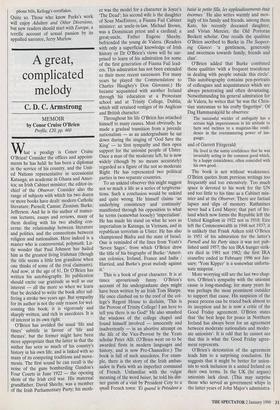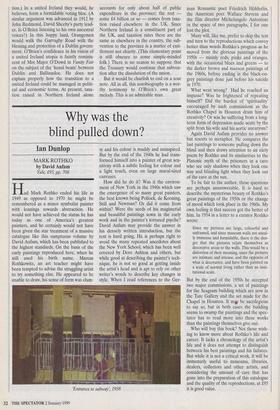A great, complicated melody
C. D. C. Armstrong MEMOIR by Conor Cruise O'Brien Profile, £20, pp. 460
1' hat a prodigy is Conor Cruise O'Brien! Consider the offices and appoint- ments he has held: he has been a diplomat in the service of his country, and the Unit- ed Nations representative in secessionist Katanga; an academic in Ghana and Amer- ica; an Irish Cabinet minister; the editor-in- chief of the Observer. Consider also the range of subjects with which his two dozen or more books have dealt: modern Catholic literature; Parnell; Camus; Zionism; Burke; Jefferson. And he is the author of numer- ous lectures, essays and reviews, many of them dealing with his two abiding con- cerns: the relationship between literature and politics, and the connections between religion and nationalism. Here indeed is a master who is controversial, polymath. Lit- tle wonder that Paul Johnson has hailed him as the greatest living Irishman (though the title seems a little less grandiose when one thinks of some of the rival claimants). And now, at the age of 81, Dr O'Brien has written his autobiography. Its publication should excite our gratitude as well as our interest — all the more so when we learn that he decided to write the book after suf- fering a stroke two years ago. But sympathy for its author is not the only reason for wel- coming this book; it is vigorously and sharply written, and rich in anecdotes. It is of interest in its own right.
O'Brien has avoided the usual `life and times' subtitle in favour of 'life and themes', but the former might have been more appropriate than the latter in that the author has seen so much of his country's history in his own life, and is linked with so many of its competing traditions and move- ments. The first sound he can recall is the noise of the guns bombarding Gandon's Four Courts in June 1922 — the opening shots of the Irish civil war. His maternal grandfather, David Sheehy, was a member of the Irish Parliamentary Party; his moth- er was the model for a character in Joyce's `The Dead'; his second wife is the daughter of Sean MacEntree, a Fianna Fail Cabinet minister; an uncle-in-law, Michael Brown, was a Dominican priest and a cardinal; a great,-uncle, Father Eugene Sheehy, befriended the young de Valera. (Readers with only a superficial knowledge of Irish history or Dr O'Brien's views will be sur- prised to learn of his admiration for some of the first generation of Fianna Fail lead- ers. This admiration has not been extended to their more recent successors. For many years he played the Commendatore to Charles Haughey's Don Giovanni.) He became acquainted with another Ireland through his education at a Protestant school and at Trinity College, Dublin, which still retained vestiges of its Anglican and British character.
Throughout his life O'Brien has attached himself to many causes. Most obviously, he made a gradual transition from a juvenile nationalism — as an undergraduate he sat down during the singing of 'God Save the King' — to first sympathy and then open support for the unionist people of Ulster. Once a man of the moderate left, he is now widely (though by no means accurately) regarded as a figure of the not so moderate Right. He has represented two political parties in two separate countries.
To an unkind observer this might suggest not so much a life as a series of tergiversa- tions. Such a conclusion would be unkind and quite wrong. He himself claims 'an underlying consistency and continuity' manifested through his opposition to what he terms (somewhat loosely) 'imperialism'. He has made his stand on what he sees as imperialism in Katanga, in Vietnam, and in republican terrorism in Ulster. He has also championed Biafra and the state of Israel. One is reminded of the lines from Yeats's `Seven Sages', from which O'Brien drew the title of his biography of Burke: 'Ameri- can colonies, Ireland, France and India / Harried, and Burke's great melody against it.'
This is a book of great character. It is at times uproariously funny. O'Brien's account of his undergraduate days might have been written by an Irish Tom Sharpe. He once climbed on to the roof of the col- lege's Regent House to declaim, 'This is the Provost of Trinity College! I am here to tell you there is no God!' He also smashed the windows of the college chapel and found himself involved — innocently and inadvertently — in an abortive attempt on the life of the Vice-Provost by the Yeats scholar Peter Allt. (O'Brien went on to be awarded firsts in modern languages and history, and is now Pro-Chancellor.) The book is full of such anecdotes. For exam- ple, there is the story of the Irish ambas- sador in Paris with an imperfect command of French. Unfamiliar with the vulgar meaning of the word baiser, he told his din- ner guests of a visit by President Coty to a small French town: 'Et quand le President a baise la petite fille, les applaudissements etait enonnes.' He also writes warmly and mov- ingly of his family and friends, among them Kate, his recently deceased daughter, and Vivian Mercier, the Old Portoran Beckett scholar. One recalls the qualities O'Brien ascribed to Burke in The Suspect- ing Glance: 'a gentleness, generosity and sweetness towards family, friends and clan'.
O'Brien added that Burke combined these qualities 'with a frequent truculence in dealing with people outside this circle'. This autobiography contains pen-portraits of colleagues and acquaintances which are always penetrating and often devastating. Notwithstanding his general admiration for de Valera, he writes that 'he was the Chris- tian statesman to his crafty fingertips'. Of Dag Hammarskjold he observes:
The successful wielder of ambiguity has a certain high imperiousness in his attitude to facts and inclines to a magician-like confi- dence in the overmastering power of lan- guage;
and of Garrett Fitzgerald:
He lived in the sunny confidence that he was invariably acting in the common good which, by a happy coincidence, often coincided with his own good.
The book is not without weaknesses. O'Brien quotes from previous writings too frequently and too extensively. Too much space is devoted to his work for the UN and too little to his time as a Cabinet min- ister and at the Observer. There are factual lapses and slips of memory. Rathmines never had a Lord Mayor; that part of Ire- land which now forms the Republic left the United Kingdom in 1922 not in 1918; Eire left the Commonwealth in 1948 not 1937; it is unlikely that Frank Aitken told O'Brien in 1951 of his admiration for the latter's Parnell and his Party since it was not pub- lished until 1957; the ten IRA hunger strik- ers died in 1981 not 1982; the first IRA ceasefire ended in February 1996 not Jan- uary; 'Yom Kipper' is a somewhat unfortu- nate misprint.
More worrying still are the last two chap- ters. O'Brien's sympathy with the unionist cause is long-standing; for many years he was perhaps the most prominent outsider to support that cause. His suspicion of the peace process can be traced back almost to its inception and he is now a critic of the Good Friday agreement. O'Brien states that 'the best hope for peace in Northern Ireland has always been for an agreement between moderate nationalists and moder- ate unionists'. It is odd that he cannot see that this is what the "Good Friday agree- ment represents.
O'Brien's detestation of the agreement leads him to a surprising conclusion. He suggests that it might be better for union- ists to seek inclusion in a united Ireland on their own terms. In the UK (he argues) unionists lack clout. (This may surprise those who served as government whips in the latter years of John Major's administra- tion.) In a united Ireland they would, he believes, form a formidable voting bloc. (A similar argument was advanced in 1912 by John Redmond, David Sheehy's party lead- er. Is O'Brien listening to his own ancestral voices?) In this happy land, Orangemen would walk the Garvaghy Road with the blessing and protection of a Dublin govern- ment. O'Brien's confidence in his vision of a united Ireland utopia is faintly reminis- cent of Mrs Major O'Dowd in Vanity Fair on the subject of the lenal boats' between Dublin and Ballinasloe. He does not explain properly how the transition to a united Ireland could be managed in politi- cal and economic terms. At present, taxa- tion raised in Northern Ireland alone accounts for only about half of public expenditure in the province; the rest some £4 billion or so — comes from taxa- tion raised elsewhere in the UK. Since Northern Ireland is a constituent part of the UK, and taxation rates there are the same as elsewhere in the country, the sub- vention to the province is a matter of enti- tlement not charity. (This elementary point is still obscure to some simple-minded folk.) There is no reason to suppose that the Treasury would continue that subven- tion after the dissolution of the union.
But it would be churlish to end on a sour note. All in all, this autobiography is a wor- thy testimony to O'Brien's own great melody. This is an admirable man.



























































 Previous page
Previous page